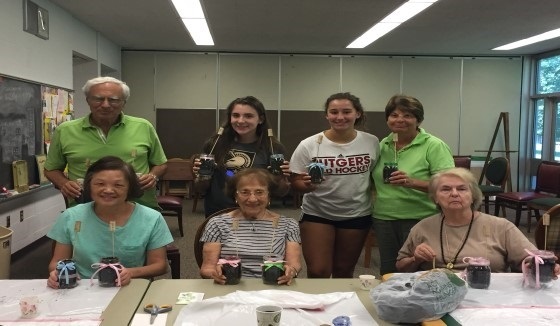
Like all high school students, Hailey Coates values technology and the convenience and fun that come with smart phones, laptops, tablets and other gadgets. But the Key Club member at Chatham High School in New Jersey also knows that tech has its limits, especially for some senior citizens.
“As technology has emerged and become more advanced, younger generations are able to keep up and share their lives around constantly advancing systems,” she says, “while older generations generally don’t keep up with the changing technology. This has created a gap between the generations.”
Coates wanted to fill that gap, and when she learned that attendees of a senior center in her city wanted to interact more with students, she had a perfect solution: the Intergenerational Buddy Program. Each month during the school year, she and her fellow Key Club members visit the Senior Center of the Chathams, a nonprofit facility that connects seniors with each other and the larger community.
The Key Clubbers plan activities for each meeting to foster positive interactions and keep the conversations flowing. Some sessions focus on hands-on activities, including planting indoor herb gardens and crafting sun catchers, door wreaths, table centerpieces, decorative jars and wind chimes. The club provides all supplies, purchased through student donations and funds from club bake sales.
Other times, the activity involves a group discussion prompted by fun discussion questions. The important part of the equation, stresses Coates, is the resulting face-to-face communication.
“I believe it is important to recognize the value of sharing real-life company with others during a time where technology has become so advanced and consumes much of my generation’s social life,” she explains. “I wanted to address that as younger generations are being raised with new and constantly changing technology, they don’t lose touch with the importance of having relationships and bonds with people, not just through their phones. I also wanted to give the older generations the opportunity to form relationships they are more familiar with from before smart phones and social media.”
The Key Club recruits student volunteers by posting each buddy session on its event opportunity spreadsheet and reaches senior center participants through fliers describing each month’s activity. The response, Coates says, makes a positive impact on both groups. By the end of the last academic year, for example, the seniors were already asking when the program would return, and students made plans to meet with their buddies during the non-school months.
“I truly felt like both generation’s participants left the meetings with feelings of warmth and happiness,” Coates says. “Students really valued seniors’ advice based on past experiences, and seniors felt good knowing their advice was going to good use. Additionally, both generations enjoyed the different activities at each meeting. After one meeting during which the activity was creating a sun-catcher craft, one senior participant said, ‘These activities really give us a feeling of accomplishing something.’”